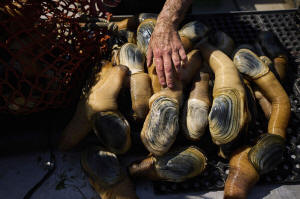How a Chinese delicacy got caught in the crossfire of Trump's trade war
[May 08, 2025] By
SALLY HO and MANUEL VALDES
SUQUAMISH, Wash. (AP) — For over two decades, Suquamish tribal member
Joshua George has dived into the emerald waters of the Salish Sea
looking for an unusually phallic clam that’s coveted thousands of miles
away.
George is a geoduck diver. Pronounced “gooey-duck,” the world’s largest
burrowing clam has been harvested in tidelands by George’s Indigenous
ancestors in the Pacific Northwest since before Europeans arrived.
In recent years it has also become a delicacy in China, with Washington
state sending 90% of its geoducks there, creating a niche yet lucrative
American seafood export.
But the escalating trade war between the U.S. and China is now crippling
an entire industry that hand-harvests geoducks, leaving Washington state
divers without work, Seattle exporters without business and Chinese
aficionados with fewer of these prized clams.
“It’s the first time in 24 years where I don’t know when or if we’ll be
going back to work or if I have to find another job or what we’re going
to do,” George said.
U.S. President Donald Trump’s tariff-driven economic feud with China,
which dates back to his first term in office, swiftly resumed in
February within weeks of taking back the White House. By April, Trump
had placed tariffs of at least 145% on China, which led China to
retaliate with tariffs of 125% on the U.S.

Top U.S. officials are set to meet with a high-level Chinese delegation
this weekend in Switzerland in the first major talks between the two
nations since the latest tariffs were imposed, but it is unclear where
those talks will lead.
Enter the geoduck, weighing about 2 pounds and so entrenched in local
culture that it is the mascot for Evergreen State College in Olympia.
The meaty mollusk is best described as sweet and briny, and it's often
sliced raw for crisp sashimi out west while China consumers prefer it
chewy in stir-fries or hot pot soups. Pre-tariff costs were as high as
$100 per pound in restaurants, so it’s a dish generally reserved for
special occasions like Chinese New Year, or to celebrate a business
gathering.
Unlike other products with long-lasting shelf life and standing
inventory, the trade war has had an immediate, direct effect on the
delicate geoducks, which are shipped alive the same day of harvest.
“The whole market, everybody just had to stop,” said Jim Boure, general
manager of Suquamish Seafoods, an enterprise of the Suquamish Tribe. “We
started getting phone calls from buyers saying orders are canceled.”
Fewer geoducks are being harvested
The millions of pounds of geoducks shipped annually to China come from
two main sources: wild harvests on tracts of seafloor that are split
between the Washington State Department of Natural Resources and Puget
Sound Treaty Indian Tribes, and tideland farms. The state’s share is
auctioned to private exporters that often hire contract divers to
harvest them.

As of late April, Washington state divers had only pulled about half of
the expected harvest from the state tracts, said Blain Reeves, an
aquatic resources division manager for the state’s Department of Natural
Resources. Last year, the state and tribes collectively harvested about
3.4 million pounds of wild Washington geoduck for sale. The state
generated $22.4 million in revenue for their half of the clams, which
went toward paying for aquatic restoration projects locally. The state
doesn't track how much is harvested by private farmers.
“If only half the pounds that were contracted are harvested, then our
revenue is halved,” Reeves said.
The Suquamish operation has no orders to harvest for at the moment, but
it still must keep up with the maintenance to stay ready for business if
and when China comes calling.
On a recent April day, George’s team made a quick trip to collect a
handful of the clams for state lab testing.
“When we’re doing the job, and it’s not all this other political stuff
behind the scenes and everything else, we love this,” said George,
adding that diving, which takes place early in the day so that the
geoducks are on an airplane by evening, has allowed him to watch his
kids grow up.
[to top of second column] |

Daniel McRae unloads a bag of harvested geoduck clams from his
brother, Derrick McRae, on their boat near Illahee State Park in
Bremerton, Wash., on Tuesday, April 22, 2025. (AP Photo/Lindsey
Wasson)
 Fellow diver Kyle Purser said he
cherishes his underwater job, but now fears it's being taken away.
"When you’re watching your money disappear and you’ve got families
to feed and not knowing when you're going to get your next paycheck,
(it's) very stressful,” he said.
America's loss is Canada's gain
The geoduck import market was already facing weaker demand in recent
years due to the Chinese economy’s struggle to regain post-pandemic
momentum. While the tariffs have only exacerbated troubles for
geoduck sellers in Washington, there's also been an unintended
consequence: The American trade war has inadvertently boosted the
Canadian geoduck business, which is facing a mere 25% tariff from
China in comparison to the 125% for the U.S.
Washington state in the U.S. and Canada's British Columbia province
are the two primary places where the wild geoducks grow naturally
for commercial harvest. The two countries did healthy business
primarily serving Chinese appetites for decades, in part because
quantities are limited. It’s a labor-intensive and heavily-regulated
harvest, as divers must go several feet below the surface to dig for
them.
“They love the fact that it tastes like the sea,” said James Austin,
president of Canada’s Underwater Harvesters Association. “It’s a
product that’s really a hit with the Chinese. It’s all about the
wild coastline. It’s really prestigious.”
Austin said he expects there will be 2.75 million pounds of Canadian
geoducks harvested in 2025, worth approximately $60 million Canadian
dollars ($43.4 million USD) in revenue.

While demand has been relatively low but still steady for Canadian's
geoducks, Austin said they're now the leading exporters for China,
which has helped them negotiate higher prices as a result. For
example, after Canada got hit with a 25% tariff in March, export
sale prices dropped to $12 per pound, and after the U.S. got hit
with a 125% tariff in April, Canadian geoducks are now being sold
for $17 a pound.
“We have no competitors right now,” Austin said.
Yang Bin at Beihai Huaxiashougang Health Industry Company in Beihai
city of Guangxi province in China said their seafood wholesale
important business no longer gets geoduck from the U.S.
“We don’t care about U.S. tariffs because we can get geoduck from
other countries with stable prices,” Yang said.
Waiting for geoducks
On their first week back to work since the tariff fight brought
business to a standstill in Washington state, Derrick McRae and his
brother pulled up about 800 pounds of wild geoducks in just one
April day.
He donned a full-body diving outfit with an oxygen line tethered to
his boat to dive under the cold waters of an inland sea channel west
of Seattle. Kneeled on the seafloor, McRae used a water spray gun to
move the sand covering the geoducks. In the cloud of sediment, he
felt for the neck with his hand, pulling the clam and stuffing it in
a net attached to him.
“We’re just kind of waiting on the edge of our seats to see what
happens next,” McRae said.

At one of the southernmost inlets, farmer Ian Child said the tariff
disruption is not just hurting his bottom line but the entire
farming process. He usually places young geoducks in the sand in the
summer, but he can’t mix new crops with any existing unharvested
clams.
“I think that the demand is still over there for the product,” he
said of China. “I think they still want it. It’s just a matter of
where the tariffs will land.”
___
Associated Press researcher Yu Bing contributed from Beijing.
All contents © copyright 2025 Associated Press. All rights reserved |